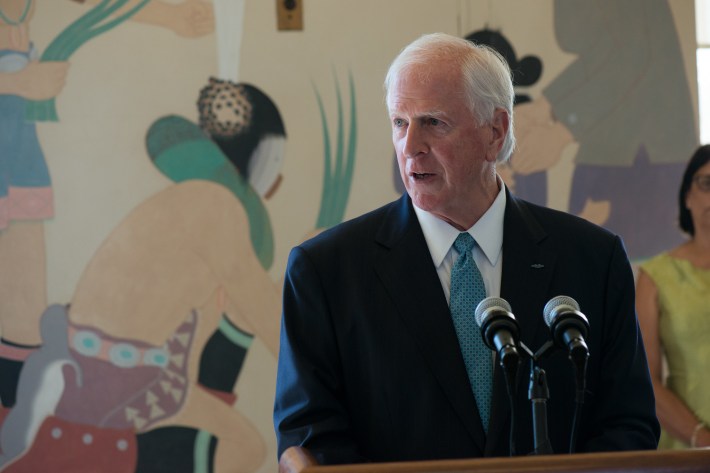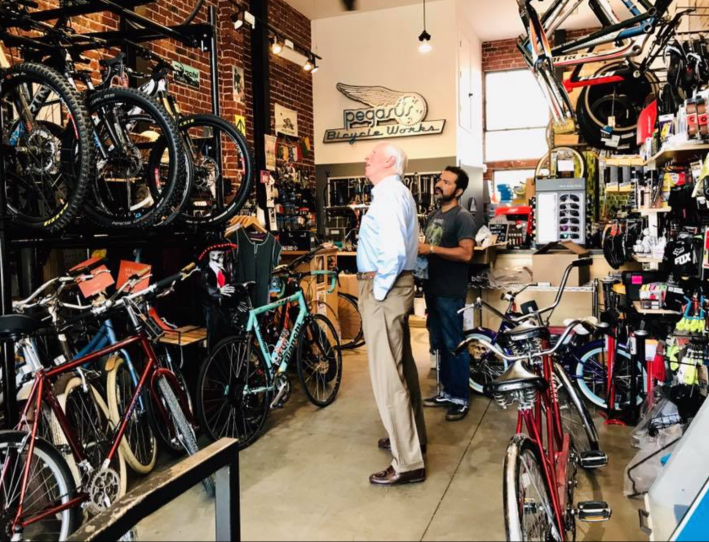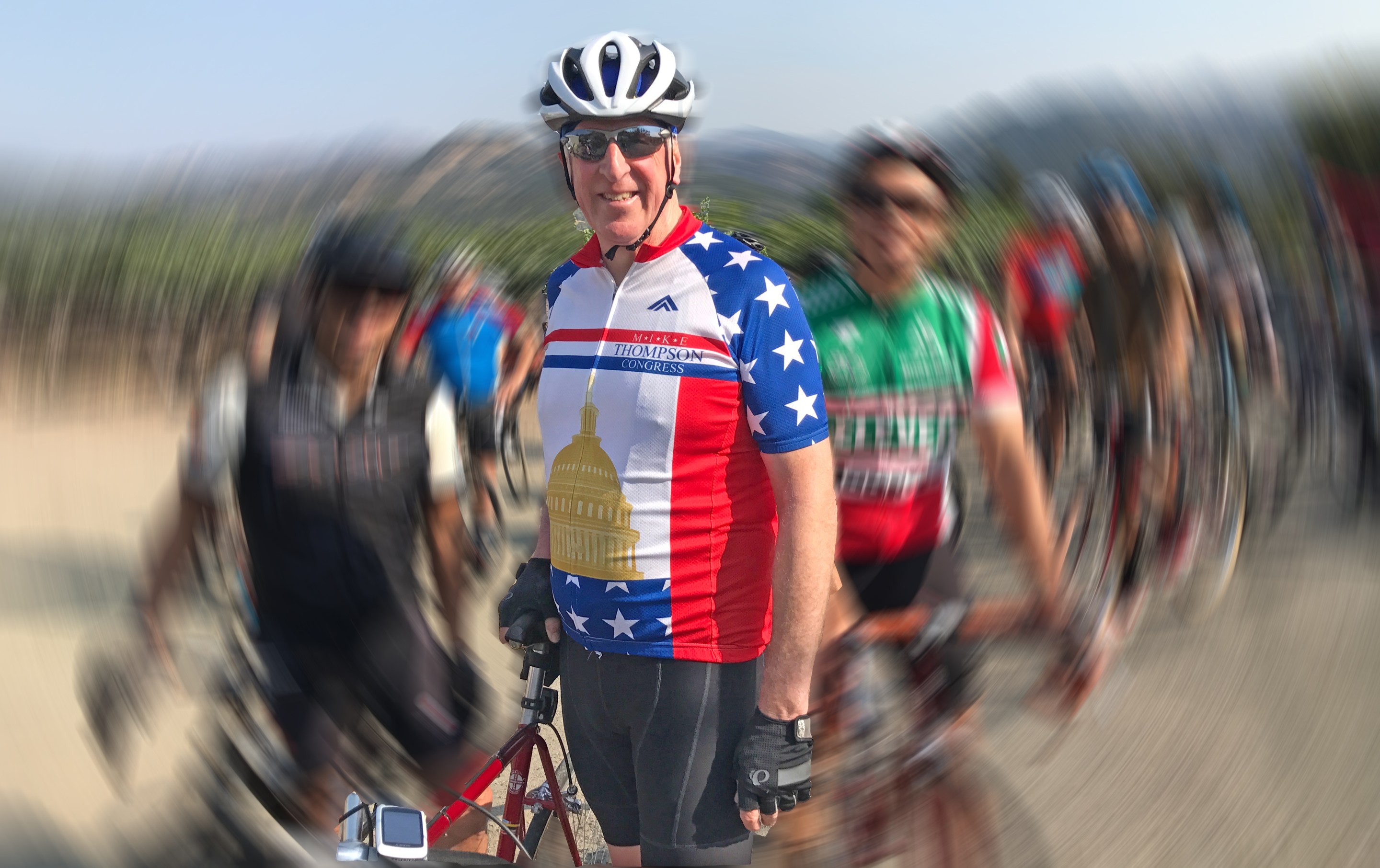When Congressional Bike Caucus founder and co-chair Earl Blumenauer retires later this year, he's passing the baton to one of its longest-serving members: Rep. Mike Thompson, a northern California Democrat who's dedicated much of his career to expanding access to people who ride. And along the way, he's gotten more than a few of his fellow legislators to see what the world looks like behind a set of handlebars.
We sat down with the wine country native to talk about how he fell in love with the bicycle as a sport, a means to get around, and a powerful policy tool, why he doesn't consider himself a cyclist despite a lifetime spent in the saddle, and how he hopes to build on Blumenauer's legacy.
Kea Wilson: Tell me a little about your personal connection to bicycling, and your journey to becoming the incoming chair of the Congressional Bike Caucus.
Rep. Mike Thompson: I don't want to mislead anyone and tell you that I'm a cyclist, but I am a bicycle enthusiast. I've been riding a bike for a long time, starting when I was a kid, when it was my first experience of freedom, just like a lot of kids. It allowed me to get out and about in the little town where I grew up. I lived on my bicycle.

I also cycled as an adult for decades. I've done bike touring, I've ridden century rides, metric century rides, I do recreational riding all the time. I have my own bike ride that I do in the Napa Valley that promotes gun violence prevention. We started doing that because we had a mass shooting, and three young women health care professionals were murdered, and we've kept that alive in the valley and used it to raise money for the outside gun groups that work on gun violence prevention issues. We're also expanding that nationally.
I have been a member of the bicycle caucus in Congress ever since I came to Congress [in 1999]. I've been trying to promote cycling on the Hill, and it's become very, very popular. I started a biking group during COVID where we would ride before work, and we've expanded that out to pick up various community members. We've had rides where we were joined by the Secretary of Transportation, U.S. senators, House members, various staffers and bureaucrats from across the campus here on Capitol Hill. And hopefully with the weather breaking we'll be able to get back to our morning rides again.
Anything we can do to promote cycling, I think we should be doing. I'm on the Tax Committee, and I had the great honor of serving on that committee with my good friend and great colleague, Earl Blumenauer, who started the bicycle caucus and asked me to assume the caucus chairmanship after he leaves Congress. Those are big shoes to fill, and I'm not going to let him just escape! I really look forward to working with him to continue to grow the caucus, to continue to work on good public policy that will make it easier for people to ride their bikes safely, and make it easier for communities to provide safe cycling areas to both create a healthier and happier community.
I say often: I believe the bike is the cure. Where else can you get exercise, fresh air, see beautiful scenery, and reduce our carbon footprint?
Wilson: Well, you say you're not a cyclist, but you certainly sound like one to me! Or at least you sound like at least a person who rides and recognizes, the value of biking to accomplish community goals. Could you say more about your experience getting other legislators riding? Why is it important that people who are shaping the policies that shape our roadways try getting in the saddle?
Thompson: For me, [biking is] a real release; it's how I get my exercise, and it gives me an opportunity to ride with other people, to talk to constituents, and experience the beauty of the outdoors. And I think that once my colleagues experience any part of that, they have a better understanding of how important cycling is.
A lot of people think, "Well, bicycling is for kids." No. The bicycle is for people. And the bicycle is for our planet. And we can do a lot more to understand significance of the bicycle in regard to proper planning, in regard to environmental protections, and as I've mentioned a couple of times, in regard to the reduction of our carbon footprint.

Wilson: One thing the Streetsblog audience may know you for is co-introducing the E-BIKE Act. Could talk a little bit about your hopes for that legislation?
Thompson: I think e-bikes are very, very important for a whole bunch of reasons. For one, there are some people for whom being able to ride an e-bike will help them get exercise that they wouldn't ordinarily get. It provides access to a healthy, safe sport for people who otherwise wouldn't be able to do that; they may not even be able to go on long walks, but the e-bike empowers them to get around.
And then I also know people who use e-bikes to commute. Here in Washington, I can look out right now out my office window onto the street, and I see nonstop cyclists — and so many of them are on e-bikes. There'll be a mom or a dad with two kids on an e-bike; I see them coming and going from the grocery store. It makes good sense to expand the number of e-bikes that are out there. And I'm hopeful that we'll be able to get the get the tax credit that will allow people a little break to buy them, on the same way that they would get a break if they were to buy an electric car or any of the other renewable energy tax incentives that we've passed in the Inflation Reduction Act. The e-bike tax credit would be 30 percent, and I think that can make a difference; it could get a whole bunch of people into that mode of transportation.
Wilson: What other policy priorities are at the top of your list as you assume the chairmanship?
Thompson: Well, there's the E-Bike Share Act, and that would provide $100 million worth of grants [per year for 10 years] to help local governments facilitate the bike share concept. There's legislation that would make it make [micromobility] charging more available, which is very, very important. And then there's good old-fashioned transportation policy and infrastructure policy: the more safe routes to everything we can provide, the more we'll provide opportunities for people to be able to ride. And that helps, most certainly, the cyclists, but it also is important to the motoring public.
Wilson: I have to ask the election-year question; what will the outcome of the next presidential election mean for American cyclists?
Thompson: President Biden has shown that he is a bike rider, and he understands the value and the importance of that. And the policies that he has pushed and signed into law — most notably, the $1.2 trillion investment in our infrastructure — [provide] a lot of opportunities for the cycling community, and for state and local governments, to access funding that will make cycling more available to folks ... So he's a friend. He's a friend that will be good for the cycling community, good for the environmental community, and good for transportation opportunities for Americans.
Wilson: Anything you want to close us out with?
Thompson: Well, next time you want to do an interview, just call me — and if you can, show up on your bicycle.






